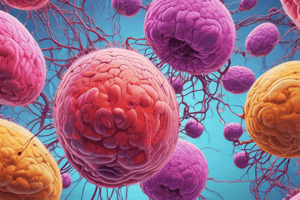Podcast
Questions and Answers
What is the concept of disease?
What is the concept of disease?
- A consequence of failing to maintain equilibrium within the body (correct)
- A condition resulting from visible structural changes only
- An abnormality that doesn't affect health
- An ailment caused by external factors
What do diseases have according to the pathologist definition?
What do diseases have according to the pathologist definition?
- Causes and Mechanisms (correct)
- Symptoms experienced by the Physician
- Visible structural changes only
- Aetiology only
What may diseases result in according to the text?
What may diseases result in according to the text?
- Structural changes visible to the naked eye (correct)
- Structural changes invisible to the naked eye
- Signs experienced by the Patient
- Symptoms visible to the Physician
How is disease defined in terms of clinical manifestation?
How is disease defined in terms of clinical manifestation?
What is the origin of the word 'disease' according to the text?
What is the origin of the word 'disease' according to the text?
What is homeostasis in the context of disease?
What is homeostasis in the context of disease?
What are some general categories of aetiological agents?
What are some general categories of aetiological agents?
What is the term used to describe diseases caused by a combination of factors?
What is the term used to describe diseases caused by a combination of factors?
What is the term used for diseases with an unknown cause?
What is the term used for diseases with an unknown cause?
What happens if the adaptive response to the cause of a disease is 100% successful?
What happens if the adaptive response to the cause of a disease is 100% successful?
What is the extrinsic cause in the example of lobar pneumonia mentioned in the text?
What is the extrinsic cause in the example of lobar pneumonia mentioned in the text?
What type of changes can result from the acute inflammatory response in lobar pneumonia?
What type of changes can result from the acute inflammatory response in lobar pneumonia?
What term is used to describe the mechanism causing a disease?
What term is used to describe the mechanism causing a disease?
Which of the following describes the secondary, systemic, or remote consequences of a disease?
Which of the following describes the secondary, systemic, or remote consequences of a disease?
What is the term for the process of conversion from active disease to quiescence?
What is the term for the process of conversion from active disease to quiescence?
What is the primary agent responsible for initiating subsequent events resulting in a patient's illness called?
What is the primary agent responsible for initiating subsequent events resulting in a patient's illness called?
Which of the following refers to the anticipated course of the disease in terms of cure, remission, or fate of the patient?
Which of the following refers to the anticipated course of the disease in terms of cure, remission, or fate of the patient?
What is the term for the re-appearance of disease signs and symptoms after a period of quiescence?
What is the term for the re-appearance of disease signs and symptoms after a period of quiescence?
What is the net effect of the mechanisms mentioned on heart muscle cells?
What is the net effect of the mechanisms mentioned on heart muscle cells?
Which subdivision of pathology focuses on the study of disorders of the cellular and coagulable components of blood?
Which subdivision of pathology focuses on the study of disorders of the cellular and coagulable components of blood?
What does histopathology primarily involve?
What does histopathology primarily involve?
Which subdivision of pathology studies the effects of known or suspected poisons?
Which subdivision of pathology studies the effects of known or suspected poisons?
What is the major purpose of immunology in the field of pathology?
What is the major purpose of immunology in the field of pathology?
Which subdivision of pathology deals with the study and diagnosis of diseases based on chemical changes in tissues and fluids?
Which subdivision of pathology deals with the study and diagnosis of diseases based on chemical changes in tissues and fluids?
What technique uses antibodies linked to enzymes to visualize substances in tissue sections or cell preparations?
What technique uses antibodies linked to enzymes to visualize substances in tissue sections or cell preparations?
Which technique extends the range of pathology to study disorders at an organelle level and demonstrate viruses in tissue samples?
Which technique extends the range of pathology to study disorders at an organelle level and demonstrate viruses in tissue samples?
What is the focus of biochemical techniques applied to the body's tissues and fluids?
What is the focus of biochemical techniques applied to the body's tissues and fluids?
Which field of study focuses on diseases caused by bacteria, fungi, viruses, and parasites?
Which field of study focuses on diseases caused by bacteria, fungi, viruses, and parasites?
Which technique involves the diagnosis and study of blood disorders?
Which technique involves the diagnosis and study of blood disorders?
What is a key advantage of cell cultures for research purposes?
What is a key advantage of cell cultures for research purposes?
Flashcards are hidden until you start studying




